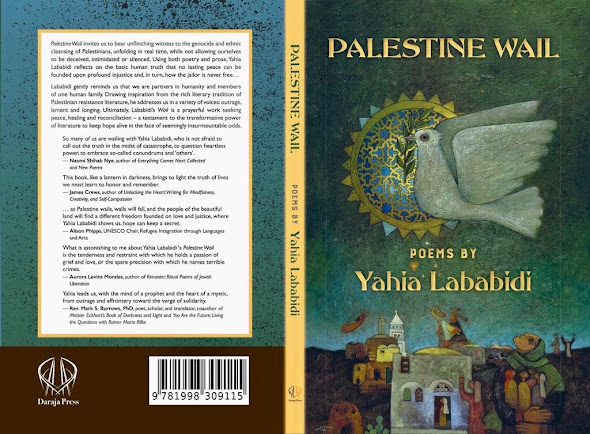In Palestine Wail: Poems, Yahia Lababidi creates a profound and unflinching exploration of the ongoing Palestinian crisis, drawing from his own heritage and heartbreak to reflect on a political and humanitarian catastrophe that has unfolded across decades. This collection, imbued with personal history, political outrage, and spiritual contemplation, serves as both a witness to injustice and a call to humanity.
The work’s origins lie deeply in Lababidi’s own roots—his Palestinian grandmother, Rabiha Dajani, was forced to flee Jerusalem at gunpoint, a traumatic event that reverberates throughout Lababidi’s poetry.
As an Arab-American writer, Lababidi is uniquely positioned to speak on the intersection of identity, politics, and human rights. His poetry, both personal and political, draws a clear line between the suffering of the Palestinian people and the complicity of global powers in perpetuating that suffering. Through his words, Lababidi eloquently counters the equation that Zionism represents Judaism, while also making it clear that criticizing Israeli actions is not synonymous with antisemitism. His poetry is a reminder that to challenge systemic injustice is an act of compassion, not hatred.
The collection offers a range of voices, from sorrow to rage, from mourning to hope, reflecting the spectrum of emotions felt by Palestinians and their supporters in the face of relentless occupation, siege, and ethnic cleansing.
Lababidi’s ability to channel these sentiments into poetry that is both intimate and expansive is a testament to his skill as a poet. He carefully balances his personal grief with a broader humanistic appeal, emphasizing that the atrocities committed in the name of self-defense are neither moral nor just. Through Palestine Wail, Lababidi calls for a refusal to be silenced, an insistence on bearing witness, and a demand for justice that cannot be ignored.
The poetic language in Palestine Wail is raw and visceral, with vivid imagery that conveys the profound suffering of the Palestinian people.
Lababidi’s use of both prose and poetry gives the collection a layered, dynamic quality, allowing for moments of lyrical beauty amid the overwhelming grief. The poems are prayerful in nature—seeking peace, healing, and ultimately reconciliation—but they are also acutely aware of the injustice that blocks these goals. As Lababidi himself writes, peace cannot be built on the foundations of profound injustice. This collection is, in many ways, a lantern in the darkness, illuminating the truth of lives and struggles that demand to be remembered and honored.
One of the most striking aspects of Palestine Wail is Lababidi’s unwavering dedication to showing the human cost of war. He condemns the use of starvation as a weapon, the targeting of children, and the collective punishment of entire communities. These poems bring to light the humanity behind the headlines, humanizing a situation that is too often reduced to a political quagmire. They force readers to reckon with the brutal realities faced by the Palestinian people, but they also celebrate their resilience, their capacity for survival, and the unbroken spirit of a people who have endured decades of violence and displacement.
What makes Lababidi’s exploration of these issues so impactful is his ability to shift the focus away from the faceless statistics of war and toward the people who suffer its consequences. His poems bring to light the humanity behind the headlines, reminding readers that the statistics we read in the media are not abstractions, but real lives torn apart by violence and oppression. Through vivid, visceral imagery, he pulls the reader into the lived experiences of the Palestinian people, challenging the impersonal, often sanitized portrayal of conflict in the media. Rather than presenting Palestinians as mere victims, Lababidi emphasizes their enduring humanity, their individual stories, and the profound impact of their collective trauma.
These poems are not just a catalog of suffering but a tribute to the resilience of the Palestinian people.
Lababidi does not allow the reader to focus solely on the devastation. Instead, he draws attention to the remarkable strength and spirit of those who have been subjected to decades of violence and displacement. Amidst the pain, there is a clear recognition of their capacity for survival, their ability to endure unimaginable loss, and their refusal to be silenced. Even in the face of death, displacement, and oppression, Lababidi celebrates the unbroken spirit of his people. His work honors their courage, their resistance, and their unyielding will to live with dignity and to continue the struggle for justice, even when the world seems to have forgotten them.
Lababidi’s ability to highlight both the profound suffering and the indomitable resilience of the Palestinian people makes Palestine Wail a deeply human work, offering readers an intimate, emotional connection to the realities of war. By grounding the political in the personal, his poems invite readers to see beyond the headlines, forcing us to confront the brutal realities faced by the Palestinian people while also recognizing their remarkable capacity for hope, resistance, and survival.
In the tradition of Palestinian resistance literature, Lababidi crafts his poems as a love letter to Gaza, invoking not only the pain of the present but also the enduring hope for a better future. His poetry is filled with a deep sense of empathy for his people, but also for all those around the world who stand in solidarity with the oppressed. It is a testament to the power of literature to ignite change, to awaken hearts, and to challenge the status quo.
In Palestine Wail, Yahia Lababidi has created a collection that is both a personal and political statement—an eloquent, impassioned cry for justice and peace in a world where those principles are too often denied. His work invites us to reflect on our shared humanity, to resist the forces that seek to divide us, and to remember that the fight for justice is, above all, a fight for dignity and the right to live free from oppression.
